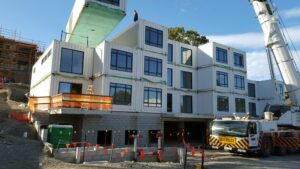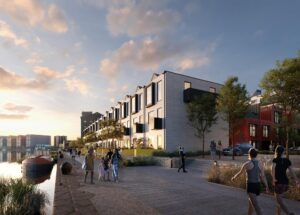
The benefits of modular construction in urban settings
![]() Urban construction projects face some unique challenges — like tight spaces, public safety and site logistics — that can make them even more challenging than non-urban projects.
Urban construction projects face some unique challenges — like tight spaces, public safety and site logistics — that can make them even more challenging than non-urban projects.
Modular construction practices — the use of prefabricated structures assembled on-site — can help mitigate some of these challenges. Adoption of these practices may make urban construction much more practical than it would be otherwise.
Why modular construction is good for projects in an urban setting
One of the most significant advantages is the improved speed of construction. Prefabricated structures are manufactured off-site, and can be quickly delivered and constructed on-site.
In some cases, the use of prefabricated or modular structures may reduce a project timeline by up to 50 percent, according to one report from McKinsey analysts.
 Construction costs tend to be lower as a result — by around 20 percent, according to the same report — which helps offset the expenses of urban construction, which can sometimes be higher due to more stringent permitting or site requirements.
Construction costs tend to be lower as a result — by around 20 percent, according to the same report — which helps offset the expenses of urban construction, which can sometimes be higher due to more stringent permitting or site requirements.
Traffic can be a major constraint for urban construction projects. Deliveries of essential resources, for example, can be significantly delayed by traffic congestion. Even predictable delays — like those caused by rush hour traffic — can cause serious trouble for a project and may delay construction in some cases.
Faster construction typically means less time spent in traffic and on the road in general — and less risk of deliveries getting caught in abnormal traffic congestion. It also means less wear and tear on a construction company’s delivery fleet.
While essential fleet maintenance will still be necessary — as inspections and preventive maintenance can significantly extend the lifespan of delivery vehicles — it may be needed much less frequently.
Quicker construction also typically means fewer delays and less chance for budget overages and revisions that requires additional work and materials.
In some cases, modular construction projects may also have less of a footprint than comparable buildings constructed with conventional techniques. This makes them a good fit for cities like San Francisco, where land is at such a premium that clients will likely want to get the most out of any lot they build on.
Permitting can sometimes be a challenge with modular construction. However, a number of cities are relaxing existing regulations or creating new rules that simplify the permitting process for modular buildings. Los Angeles, for example, recently streamlined the process of building accessory dwelling units by pre-approving several modular building designs.
How modular construction can benefit urban communities
 Modular construction can also be beneficial for the residents of a neighborhood. Faster construction typically means less traffic. And the less time spent on a project, the fewer days residents will have to contend with delivery trucks and commuting construction workers. Faster construction can also mean less noise pollution.
Modular construction can also be beneficial for the residents of a neighborhood. Faster construction typically means less traffic. And the less time spent on a project, the fewer days residents will have to contend with delivery trucks and commuting construction workers. Faster construction can also mean less noise pollution.
Other benefits of modular construction won’t be felt in the short term, but may still be desirable to clients of urban construction companies.
For example, modular buildings are often very eco-friendly compared to their conventional counterparts. Off-site construction allows for much less waste than typical construction processes and the use of energy-efficient and eco-friendly materials. This is because waste generated by the manufacturing process is much easier to reuse than construction site waste.
Waste from factory projects can typically be shifted to another manufacturing project happening at the same time, while construction waste must be gathered, transported from the site, and stored before it will be reused.
The construction industry accounts for around 36 percent of global energy consumption and produces around 39 percent of energy-related carbon emissions. Finding ways to cut down on the high energy costs associated with construction could help make the industry and new buildings much more sustainable.
How modular construction improves urban construction projects
Modular construction can help construction companies manage some of the challenges associated with urban construction.
Faster construction speed and reduced costs can help companies manage the expenses associated with urban construction and minimize impact to area residents. Modular construction is also typically more sustainable than conventional construction, which may help a company reduce its carbon footprint.








